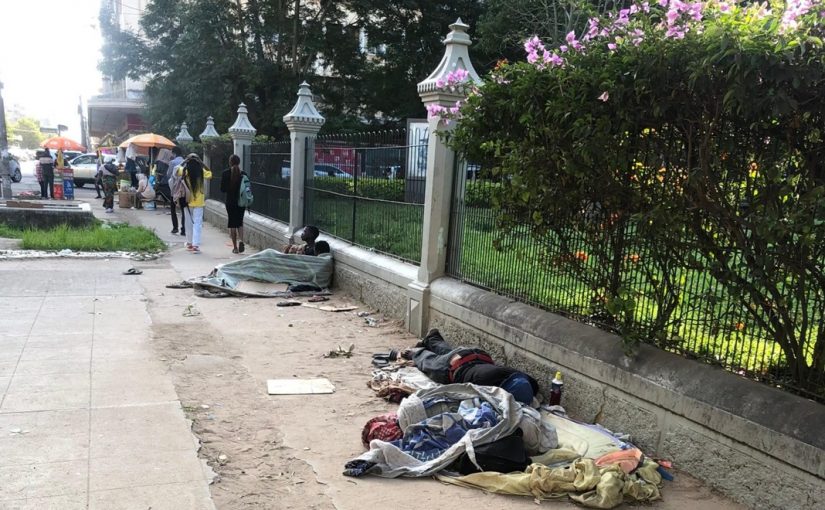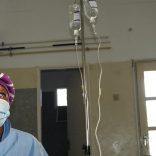Mozambique: Five cases of human trafficking recorded over first semester
Living between the streets and a home: The daily struggle of child beggars in Maputo

Photo: AIM
“Children are flowers that never wither,” a famous statement by Mozambique’s first president, the late Samora Moisés Machel, echoes in the country’s collective memory.
However, the current reality is alarming, as these “flowers” are increasingly exposed to situations such as child labour, early marriages and, especially, begging.
It is the latter that AIM intends to address.
Stories of survival on the streets
“I ended up here on the streets because of my father,” revealed Chelton Aurélio, a young man who represents many others in Maputo who have found a new home on the streets.
Originally from the Boane district in southern Mozambique, Aurélio says he ran away from home after being attacked several times by his father.
“My father would beat me for nothing, so one day I got tired of it and ran away,” he said. Despite his desire to return, the fear of violence keeps him on the streets, where he has found a new family among other young people in the same situation.
“I have friends in every corner of the city. We are always begging for money,” he says, tears welling up in his eyes. Aurélio knows about the existence of shelters, but says they are far away, in the Zimpeto neighborhood, about 25 kilometres from where he lives.
The boy even contacted his neighbours, who took him to a police station, but the response was not entirely satisfactory, as all he got from there was a summons to his father, which he proceeded to “tear up”.
He added that even if his father were arrested, he would not be at ease, since his departure could do “something more dangerous than beating me”. He explained that “my mother passed away, and when my stepmother tries to intervene, she gets beaten too”.
Another young man, Crimildo Luís, has a similar story. He left his home in the Boquisso neighbourhood of Maputo more than three years ago, allegedly because his stepmother would not give him food. “She wouldn’t give me food, so I decided to live on the streets”, he said.
Although he tried to return, the situation did not change and he finds himself caught between the need to survive on the streets and the desire for a better life.
Nelson David, 14, first ran away from home out of curiosity. “I wanted to get to know the city”, he said. Although he did not face violence, he preferred to spend time on the streets. “I go back home and take money to help”, he explained.
Bernardo Mbendzane, on the other hand, left his grandmother’s house due to the domestic chores that fell on him. “I would go out at dawn to fetch water, and I was tired of it,” he said, referring to his exhausting routine.
Even knowing the risks, he returned to the streets, where he faces adversities such as cold, mosquitoes, violence, diseases, among others.
A crisis that worries
These young people are just a few examples of a reality that worries municipal authorities.
Anabela Inguane, councilor for Women, Social Welfare and Family in Maputo City, the Mozambican capital, recognizes that child begging is at the top of the municipality’s priorities, which is why “we are mapping children on the streets and their activities”.
The action plan includes partnerships with non-governmental organizations and other institutions to create spaces where these children can participate in academic and artistic activities, aiming at future autonomy. “We don’t want these children to grow up vulnerable, because tomorrow they could be dependent adults susceptible to crime,” Inguane warns.
“What happens is that many children on the streets are looking for a way to survive, washing cars, cleaning windshields at traffic lights, and asking people for money as they pass by. This child who is at the traffic light today, cleaning the car window, and in exchange the driver gives him some change, this child in a few years will be a teenager, young person or adult whose change will no longer be enough for his needs. So we wouldn’t want our children to grow up in this vulnerability, because tomorrow they will be men,” Inguane points out.
Giving money to beggars goes against city of Maputo municipal policy because it will supposedly “produce vulnerable, dependent adults susceptible to committing crimes”.
Giving street children money perpetuates dependency, he says. “We are looking for alternative ways to help, where people can contribute directly to childcare centres.”
Inguane said that the existing shelters, most of which are private, do help to reduce the number of these minors, but the “flea that bites the ear” of the municipality are the children who are in shelter, but who go out onto the streets every morning.
Child trafficking: A growing risk
The problem of begging is closely linked to child trafficking. In an alarming scenario, at least 14 Mozambican minors were trafficked for labour exploitation in South Africa last year. “These numbers are just the tip of the iceberg,” said judge Márcia Pinto, coordinator of the National Reference Group for Child Protection.
She said that the reality of trafficking is complex and often invisible. “The numbers do not always reflect the reality on the ground, because human trafficking is difficult to detect,” she says.
Most victims are people who live in vulnerable situations and are easily lured with promises of better living conditions. “These children often end up in situations of labour or sexual exploitation,” Judge Pinto explains.
Raising awareness in society is crucial in this context. “We are carrying out campaigns to inform people about the risks of trafficking. The more people know, the more they will be able to protect themselves and their children,” Pinto says.
Future perspectives: A call to action
AIM also sought comment about the issue from a social worker in the city of Nelspruit, in neighbouring South Africa.
“In most cases we see, children come with older people who promise their parents that they will get a better education. But when they get here, there is nothing like that,” said Nomuzi Mkabela, who runs a shelter in the region.
She stresses the need for a more robust approach to protecting vulnerable children. “Unfortunately, many of these children are sexually abused, involved in prostitution, and other types of exploitation,” she says.
This alarming reality raises questions about the effectiveness of child protection policies.
The reality of these children, such as Aurélio, Crimildo, Nelson, and Bernardo, serves as an urgent reminder of the need for action and compassion in a society that often fails to protect the most vulnerable.
The city of Maputo reflects a crisis that is spreading throughout the country, exacerbated by the vulnerability of families and the lack of effective policies.
By Custódio Cossa, AIM Moçambique












Leave a Reply
Be the First to Comment!
You must be logged in to post a comment.
You must be logged in to post a comment.